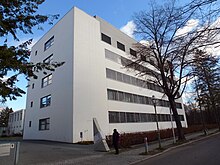Fritz Haber Institute of the Max Planck Society

The Fritz Haber Institute of the Max Planck Society (FHI) is a science research institute located at the heart of the academic district of Dahlem, in Berlin, Germany.
The original Kaiser Wilhelm Institute for Physical Chemistry and Electrochemistry, founded in 1911, was incorporated in the Max Planck Society and simultaneously renamed for its first director, Fritz Haber, in 1953.
The research topics covered throughout the history of the institute include chemical kinetics and reaction dynamics, colloid chemistry, atomic physics, spectroscopy, surface chemistry and surface physics, chemical physics and molecular physics, theoretical chemistry, and materials science.[1]
During World War I[2] and World War II,[2] the research of the institute was directed more or less towards Germany's military needs.
To the illustrious past members of the Institute belong Herbert Freundlich, James Franck, Paul Friedlander, Rudolf Ladenburg, Michael Polanyi, Eugene Wigner, Ladislaus Farkas, Hartmut Kallmann, Otto Hahn, Robert Havemann, Karl Friedrich Bonhoeffer, Iwan N. Stranski, Ernst Ruska, Max von Laue, Gerhard Borrmann, Rudolf Brill, Kurt Moliere, Jochen Block, Heinz Gerischer, Rolf Hosemann, Kurt Ueberreiter, Alexander Bradshaw, Elmar Zeitler, and Gerhard Ertl.
Nobel Prize laureates affiliated with the institute include Max von Laue (1914), Fritz Haber (1918), James Franck (1925), Otto Hahn (1944), Eugene Wigner (1963), Ernst Ruska (1986), Gerhard Ertl (2007).
Structure
There are five departments with a number of research groups within:
- Inorganic Chemistry (Robert Schlögl)
- Reactivity (Annette Trunschke)
- Electronic Structure (Axel Knop-Gericke)
- Liquid/vapor Interfaces (Hendrik Bluhm)
- Electron Microscopy (Thomas Lunkenbein)
- Interface Science (Beatriz Roldan Cuenya)
- Liquid Phase Electron Microscopy (Wee Chee)
- Scanning Probe Microscopy (Markus Heyde)
- Photo-Electrochemical Scanning Probe Microscopy (Christopher Kley)
- Thin Films (Helmut Kuhlenbeck)
- Structure and Reactivity (Shamil Shaikhutdinov)
- Spectro-Microscopy (Thomas Schmidt)
- Operando Hard X-ray Spectroscopy (Janis Timoshenko)
- Molecular Physics (Gerard Meijer)
- Controlled Molecules (Sandra Eibenberger-Arias)
- Spectroscopy and chemistry of metal clusters and cluster complexes (André Fielicke)
- Interactions of molecules with fields (Bretislav Friedrich)
- Infrared excitation of gas-phase molecules and clusters (Gert von Helden)
- Cold and ultracold molecules (Stefan Truppe)
- Liquid microjets (Bernd Winter)
- Physical Chemistry (Martin Wolf)
- Quantum Transport & Nanoelectronics (Matthias Koch)
- Nanoscale Surface Chemistry (Takashi Kumagai)
- Ultrafast Scanning Probe Microscopy (Melanie Müller)
- Lattice Dynamics (Alex Paarmann)
- THz-Driven Molecular Dynamics (Mohsen Sajadi)
- Nonlinear Spectro-Electrochemistry (Yujin Tong)
- Interfacial Molecular Spectroscopy (Kramer Campen)
- Structural & Electronic Surface Dynamics (Ralph Ernstorfer)
- Terahertz Physics (Tobias Kampfrath)
- Electron Dynamiχ (A. Julia Stähler)
- Transient X-ray Spectroscopy & Diffraction (Michael Zürch)
- Dynamics of Correlated Materials (Laurenz Rettig)
- Theory (Matthias Scheffler)
- Unifying Concepts in Catalysis (Sergey Levchenko)
- Heat and Charge Transport (Christian Carbogno)
- Ab Initio Biomolecular Simulations (Carsten Baldauf)
- Simulations from Ab Initio Approaches: Structure and Dynamics from Quantum Mechanics (Mariana Rossi)
- Big-Data Analytics for Materials Science (Luca M. Ghiringhelli)
- Crystal-Structure Prediction and Heterogeneous Catalysis (Matthias Scheffler)
- Max Planck Fellow Group (Claudia Draxl)
- Max Planck Partner Group for Advanced Electronic-Structure Methods (Xinguo Ren)
References
- ^ B. Friedrich; D. Hoffmann; J. James (2011). "One Hundred Years of the Fritz Haber Institute". Angew. Chem. Int. Ed. 50 (43): 10022–10049. doi:10.1002/anie.201104792. PMID 21957069.
- ^ a b "FHI - Historical Review of the Fritz-Haber-Institut". Fhi-berlin.mpg.de. Retrieved 2013-08-23.
External links
52°26′54.6″N 13°16′58.8″E / 52.448500°N 13.283000°E
